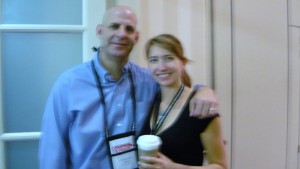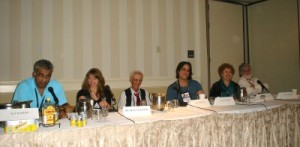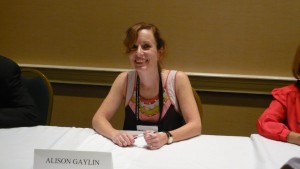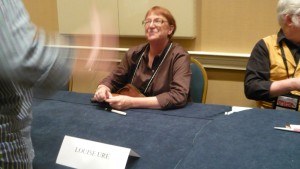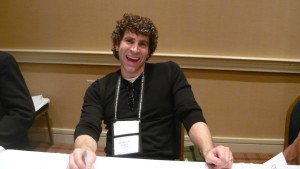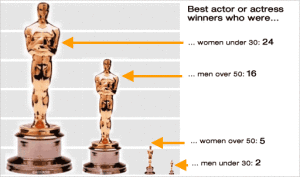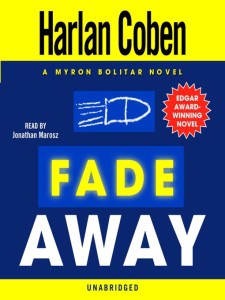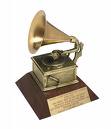Until I received an invite to Bouchercon, I had no idea conferences like that even existed (and until relatively recently, I had no idea how to properly pronounce Bouchercon, either, as it turns out. I have to stop myself from French-ifying it).
How cool, I thought- the opportunity to meet some of my favorite authors and discuss their books with like-minded fans. When I joined some of the online mystery groups and found out that not only could I attend, but I might even be asked to serve on a panel, it was downright mind-boggling. So the year my debut thriller was released, I devoted most of my marketing budget to conference fees, flying everywhere from Anchorage to New York.
Was it worth it?
Well, I had a great time, that’s for sure. The camaraderie at these conferences is fantastic- where else could I spend a night kicking back with Jeffery Deaver and Harlan Coben? But after two years of attending as many as I could afford, I’ve developed some basic parameters:
- Cost and release dates: My last two books had summer releases: great for conferences, since most of the big ones occur between March and October and they’re clustered in the summer months (I always think of Bouchercon as closing out conference season). THE GATEKEEPER will be released in November, so I’m cutting back dramatically on what I attend since I’ll just end up pitching BONEYARD to people, many of whom already heard about it last year. Cost is always an issue- even if the conference fee isn’t very expensive, once you factor in all the ancillary costs (travel, hotel, etc), each conference runs me at least a grand. And that adds up quickly. Which leads to…
- What do I hope to get out of it? Mind you, I love hanging out with fellow writers and fans, but it’s hard to justify spending a thousand dollars over a weekend to do that (especially in this economy). So ideally, I hope to get on at least one good panel, and to network with people I haven’t met yet. There’s always a lot of debate on the lists about which conferences are worth attending, and I’m certain that everyone has a different experience. You might sell more books at smaller regional ones where you’re one of a handful of authors, whereas at larger conferences you might get lost in the shuffle. Yet at those big conferences there’s an opportunity to meet domestic and foreign editors, booksellers, and agents, and to get your name out to a larger cross-section of mystery fans.And sometimes the regional conferences are skewed toward local authors, so if you’re not from the area, you might find yourself relegated to the panel on bug detectives (not a well-attended one, in my experience). So it largely depends on what your career goals are at that given moment. Personally, I’m doing the same thing with conference attendance that I do with my financial portfolio: spreading it out between smaller conferences like Left Coast Crime (they had me at “Hawaii”) and big ones like Bouchercon (which I always seem to get a lot out of).
- Is it a fan conference, or a writing one? Not that writers aren’t fans- we all are, obviously. But some conferences specialize in helping new authors hone their craft and pitch agents- which is invaluable for them, but I’ve discovered that at those conferences, I spend most of my time dodging requests to pass a manuscript on to my agent. I’d much rather go to a true fan conference, where most of the attendees are readers who want to meet their favorite bestselling authors, and who might be persuaded to try a new one as well.
- Which genre does the conference emphasize? I’ve gone to a few romance conferences, and so far haven’t had much luck with those (although I know my friend Alex Sokoloff has had a much more positive experience). For me, going to RWA felt like starting over again; I didn’t know the lingo, and since romance isn’t a major component of my books, I drew a lot of blank stares. I’m considering giving Romantic Times a shot when it lands a bit closer to home, but flying to Orlando isn’t a possibility for me this April.
Even though I’m cutting back, as of right now I plan on attending Left Coast Crime, LA Times Festival of Books (a cheap flight, and I can stay with friends), Book Passage (local, and no conference fee), and Bouchercon. I’m on the fence about Thrillerfest, since NY is just so darn expensive, and I’m skipping BEA since my ARCs won’t be ready yet. Also, no Edgars for me, sadly, or Sleuthfest (I could really use a trip to Florida, too. Oh well).
On the plus side, this leaves my summer largely free. But I have to wonder what poor Harlan and Jeffery will do without me. So my question for the day is: are you going to any conferences? Which ones, and why?



